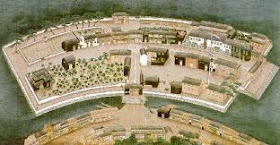To have an incompetent as Prime Minister may be regarded as a misfortune, but to have a crass incompetent looks more like carelessness.
It may have been merely crass to make such speech in Munich, of all places, which gave the supreme mono-culturalist Hitler his early power base. The Woolwich attack against a British soldier last week has also shown it to be deeply misguided: Hazel Blears pointed out, in reaction to that attack, that it had been shortsighted to emasculate the ‘Prevent’ programme, which she had led in the previous government, and which aimed to channel local money into moderate organisations, to turn young people away from extremism.
And when did Cameron announce the plan to ‘review’ (read ‘cut to the bone’) the Prevent programme? Why, in his Munich speech.
In any case, why is multiculturalism receiving such a bad press? It is often one of the most powerful source of riches in a society. For instance, I have a superb recording of Mozart’s piano sonatas on in the background as I type this, and it’s hard to imagine a more striking illustration of the benefits of multiculturalism.
Back in the 1630s, the new rulers of Japan, just emerged from a terrible century of civil war, decided that peace required rigid controls. As well as severe internal measures, they decided to allow no further contact with the outside world: nobody would go out, nobody would be allowed in. Even Japanese nationals then abroad would be refused the right to return home.
As an exercise in mono-culturalism, this attempt at seclusion could hardly be exceeded.
In reality, small exceptions were made to these draconian measures. After all, political power’s important, but trade provides life’s luxuries, and if you have political power, luxuries are pretty much a necessity. So the Shogunate allowed limited trade with China, Korea and even with Europe.
The Portuguese had built good (commercial) relations with Japan, but missionaries had come in their wake and made some inroads into local communities. Worshippers of the Prince of Peace can sometimes become seriously troublesome, and the Japanese decided they’d had enough of the Portuguese; from 1641 onwards, they only allowed European trade with the Dutch, and only through an artificial island in Nagasaki harbour.
 |
| The trading post on Dejima island: sole point of contact with Western culture in Japan for over two centuries |
The Dutch were Protestant, which probably made the Japanese think they’d be less trouble: they hadn’t met some of the more far-out sects of our days, in the United States, say, or Northern Ireland.
The relative seclusion of Japan lasted for nearly two and a half centuries. And what centuries they were in Europe: this was the time of Galileo and Huyghens, of Newton and Lavoisier, of Fermat and Linnaeus and Gauss. A time for the blossoming of enquiry and discovery.
The Japanese have exactly the same hunger for understanding and knowledge as anyone else. So on board the Dutch ships that arrived at Dejima island in Nagasaki Bay, there were books, books, books.
Japanese intellectuals painstakingly translated these works, sometimes word for word, so that they could share in the great awakening taking place in the West.
In the mid-nineteenth century, the West forced Japan to open its doors. Force was used at first, but the Japanese leaped at the opportunities it created. The nation quickly became a world power, a huge trading centre, with political institutions modelled on Western lines, with great centres of learning in which the world’s knowledge was taught, with – and this would end in tears in the middle of the next century – great military power too, capable of inflicting a crushing defeat on the Russian navy in 1905, just 37 years after the end of the Shogunate.
In the middle of all this, Japan took up Western music as well, and learned to excel in it. Have you seen the Japanese film Departures? If not, track it down and watch it now. The central theme is the deeply traditional practice of preparing bodies for the coffin, a preparation carried out with great art and love; but the protagonist of the film is a young cellist and in an early scene we see his orchestra performing Beethoven’s ninth symphony.
Such are the deep roots that Western music has put down in Japanese culture.
I found that surprising when I first learned of it, but I also found it moving. So it was poignant to hear the Japanese pianist, Mitsuko Uchida, talking to the BBC nearly twenty years ago about her joy at being able to record the Mozart sonatas in their entirety. I could feel, even in a radio interview, all the love she felt for this great music, a love reflecting an understanding and sensitivity far beyond my powers, although in theory this was my culture and not hers.
 |
| Mitusko Uchida: born in Japan, she's made Western music her own |
That’s multi-culturalism, and what a powerful source of good it is. Uchida has, since then, given it still stronger expression, taking out British nationality and becoming, indeed, a Dame Commander of the British Empire. I have my doubts about those titles and honours, but I’m unambivalent in my delight that she received one.
So I sit back and enjoy Uchida’s extraordinary, light but powerful, sensitive but humorous, rendering of some of the greatest music the West has produced. And I wonder at Cameron’s crass words against multi-culturalism.
We need to remind ourselves of those men of secluded Japan who struggled through works from an alien culture, whose contents they knew they somehow had to penetrate. And how the the seeds they sowed blossomed in work like Uchida's.
What is there to reprove, and not to admire, in their multi-cultural efforts?
No comments:
Post a Comment